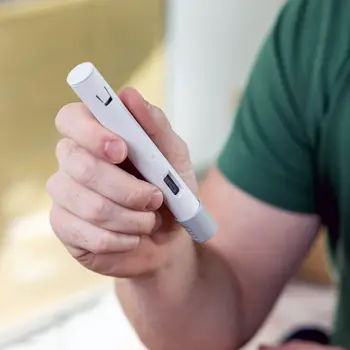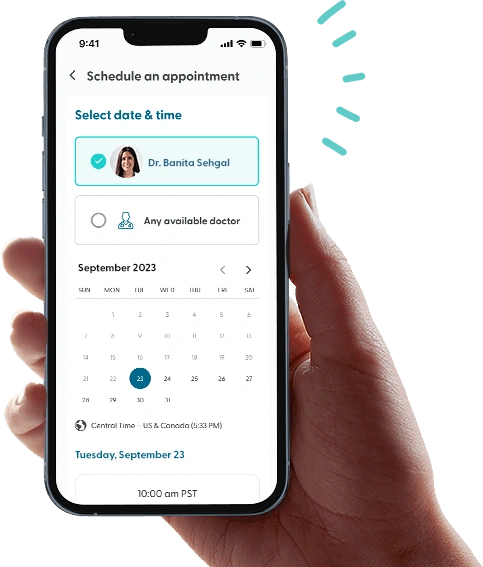How to Successfully Overcome a Weight Loss Plateau
Weight loss can be a challenging journey for many. It becomes especially difficult when the number on the scale just won’t budge despite your best efforts. This is called a weight loss plateau.
Research has found that people typically lose weight rapidly within the first few months of exercising and switching to a healthy diet.
However, a recent study found that many people experience a weight loss plateau around three to six months into their journey.
There are several strategies that you can use to break a weight loss plateau and continue to shed those pounds.
Get prescription weight loss medication online.
Find out if you're eligible for GLP-1s, and get started on your weight loss journey.


Understanding Weight Loss Plateaus
If you’ve recently started living a healthier lifestyle with exercise and a low-calorie diet, you’ve likely been experiencing weight loss.
But after a couple of months, you may notice that you’re not losing weight at the same rate as before, or you’ve stopped losing weight entirely.
This is a plateau, and it is a relatively common part of trying to lose weight. Even if you’re eating well and exercising regularly, you may reach this point, which can be very frustrating.
What causes a weight loss plateau?
Several factors may be contributing to your weight loss plateau.
Shedding water weight
When you initially start cutting down on the calories you eat and becoming more active, your body draws from its stores of glycogen.
Key Point: What is Glycogen?
Glycogen is a type of carbohydrate that is naturally found in the liver and muscles. This carbohydrate is made partly of water, so when your body starts to burn glycogen for energy, it releases water and this can result in noteworthy weight loss. But it may only be temporary.
Loss of muscle mass
Another factor that contributes to rapid initial weight loss is that you will lose some muscle mass and fat when you first start out.
Muscle mass contributes to the rate at which you burn calories — also known as your metabolic rate — as they require energy to contract and relax. This can mean that muscle loss can cause your metabolic rate to slow down.
When the metabolic rate slows, you burn fewer calories than you did at the beginning of your weight loss journey, resulting in a possible plateau. This is called metabolic adaptation.
A biological response
Research has also found that weight loss plateaus happen due to the body’s biological response to imminent danger.
When we start consuming fewer calories and become more physically active, the body perceives the subsequent weight loss as a threat.
As a result, the body adjusts to protect itself and reduces its metabolic rate to burn less energy.
How to Break Through a Weight Loss Plateau
It’s important to practice patience and have realistic expectations when it comes to breaking a weight loss plateau.
Overcoming it takes time, and you’ll need to find ways to help your body get back on track to achieve those weight loss goals.
A weight loss plateau is a sign that your previous approach, although once successful, is no longer working. It means that it’s time to change your strategy if you want to continue seeing results.
Review your food intake
One of the first steps to overcoming a plateau is reassessing your calorie intake.
Using a food journal to track everything you eat is a good start. It can provide valuable insight into your eating patterns and the quantities of food you’re consuming.
Recent studies have found that we often don’t realize how many calories we eat. Once the participants in one study became aware of their caloric intake, they could understand where extra calories came from.
You may be eating too much of one particular macronutrient, like carbohydrates or unhealthy fats. Or you could be consuming too many empty calories or unhealthy foods, meaning your body isn’t getting the nutrition it needs.
Nutrition strategies for progress
Some other adjustments you can make to your diet that may help you overcome a plateau include:
Eating a healthy and substantial breakfast: Studies show that your body burns more calories in the morning than in the evenings, so you may want to reduce the size of your evening meal.
Create a calorie deficit: Consuming fewer calories than you are burning may be an effective way to curb a plateau. However, be cautious not to eat less than 1,200 calories for women and 1,800 calories for men per day, as this can leave you feeling hungry.
Lower your carb intake: Studies show that eating 50 or fewer grams of carbohydrates per day can lead to more weight loss than other diets.
Include more fiber in your diet: Fiber helps you feel fuller for longer and it’s something more than 50% of the U.S. population lack in their diets.
Increase your protein intake: Digesting protein makes your body burn calories up to 30% faster than when you eat carbs, which may help increase your weight loss.
Key Point: Meal Planning May Help
Not only does planning your meals ahead of time make preparing food easier, but it also helps to ensure you’re eating according to your weight loss goals.
By planning ahead, you can be certain you’re getting enough nutrient-rich foods in your diet and that your portions are controlled — all of which can contribute to positive results.
Adjust your fitness and exercise routine
Another factor to reconsider when you reach a weight loss plateau is the type of physical activity you're engaging in.
Although your initial exercise program may have helped you lose weight, there's a good chance you need to increase the frequency and intensity of your exercise regimen to prevent the weight loss stall.
Key Point: Building Muscle May Help You Lose Weight
Research shows that resistance and strength training can help you build and maintain muscle mass, which has a positive effect on how the body burns calories.
Lean body mass, which includes muscle, is what burns calories in our bodies throughout the day. The more we have, the faster our bodies become at burning calories at rest.
Ready to achieve your weight loss goals?
Shed pounds with GLP-1 medication prescribed online by licensed healthcare providers.


High-intensity interval training (HIIT) has also been scientifically proven to counteract the slowing of the metabolism due to weight loss.
Although it’s important to incorporate strength-building exercises into your routine, this doesn’t mean you have to lift weights at the gym. You can use exercises that rely on your body weight to build muscle, such as push-ups, planking, and squatting.
Consider your stress levels
Stress significantly impacts weight loss and can easily cause a weight loss plateau. This is because cortisol — a stress hormone known for increasing belly fat — is released when you’re stressed.
Studies have found that learning to manage stress can promote weight loss. Stress management techniques you may want to try include deep breathing exercises, progressive muscle relaxation, or keeping a journal.
In one study of obese women, it was found that those that followed a stress management program saw a weight loss of just under 10 pounds in eight weeks.
Make lifestyle modifications
Aside from a balanced diet and exercise, there are other changes you can make to your lifestyle to begin losing weight again.
Getting more sleep
Not only is sleep important for stress management and regulating emotions, but it’s also a vital part of preventing weight gain. Adjusting your sleep schedule may even aid in breaking a plateau.
According to research, lack of sleep can lower the rate at which our metabolism operates, meaning we burn fewer calories at rest.
It can also increase body fat and make your body store more of it. Some studies have even found that too little sleep can trigger hunger, resulting in consuming more calories.
Staying hydrated
Fluids play a vital role in the body, and research suggests that consuming more water can help you lose weight.
Drinking clear, calorie-free liquids may:
Suppress your appetite, meaning you naturally want to eat less
Increase your metabolism
Enhance your exercise routine by delaying how quickly you feel tired
Limiting alcohol
There are several reasons to reduce your alcohol intake if you are attempting to break a weight loss plateau.
Overeating: As alcohol lowers inhibitions, it may lead to overeating or making the wrong food choices.
Reduced fat burning: Research has found that alcohol may suppress how the body burns fat, potentially leading to weight gain.
Low blood sugar: Studies have shown that alcohol can cause your blood sugar levels to drop, stimulating your appetite, and making you more likely to overeat.
Seeking support and accountability
A weight loss plateau can be emotionally distressing, especially after seeing positive results at the start of your weight loss plan.
It can be useful to seek support during a plateau from those who are experiencing the same thing or have faced weight loss challenges.
Joining online communities or support groups can positively impact how you view your plateau and help you to move past it.
Key Point: Work with a Healthcare Professional
Working with a healthcare provider throughout your weight loss journey may be beneficial, especially if you reach a plateau.
At LifeMD, we’ve developed an online weight loss management program that combines lifestyle coaching with medical assistance to help you achieve your goals.
You’ll start with a full medical assessment, including lab work, to determine what may be holding you back from losing weight or what could be causing weight gain.
We’ll then develop a personalized program for you to follow along with ongoing support and check-ins.
Where Can I Learn More About Weight Loss Plateaus and Other Challenges?
With LifeMD, you can get weight loss support and medical assistance from the comfort of your home. If you want to learn more about strategies to lose weight effectively and overcome a plateau, book an appointment with one of our board-certified healthcare providers.
You may also be interested in enrolling in the LifeMD Weight Management Program. Enrolling in the program means you’ll be working closely with licensed clinicians who will design a personalized plan to help you lose weight. Make an appointment today to get started.
More articles like this
Feel better with LifeMD.
Your doctor is online and ready to see you.
Join LifeMD today and experience amazing healthcare, discounted labs and prescription medications... plus around-the-clock access to medical guidance.

GLP-1
Ozempic® Wegovy® Zepbound®
This is it! Be part of the weight loss movement everyone’s talking about.
Get Started Now












